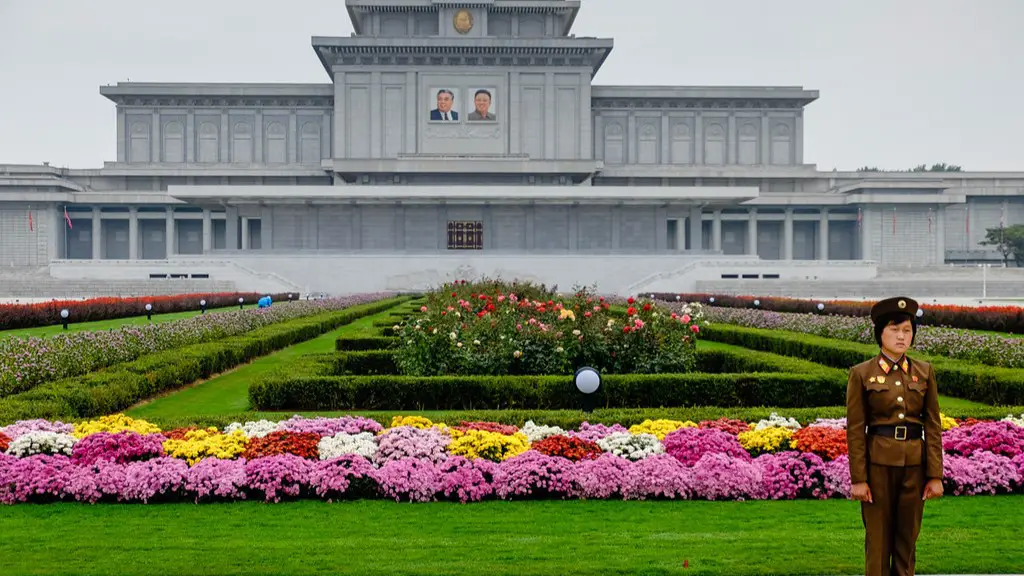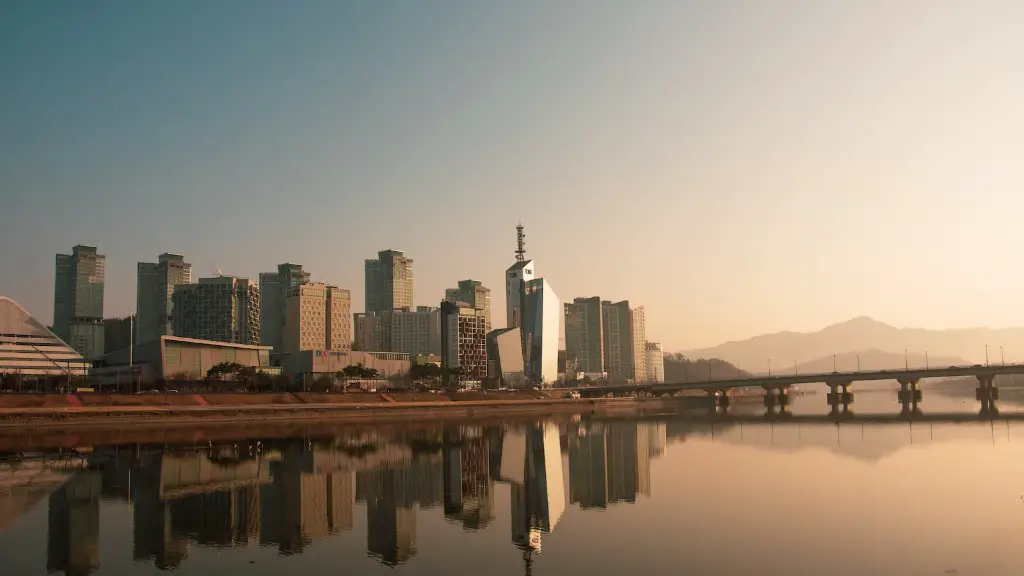North Korea’s Propaganda Network
North Korea is known as one of the most repressive countries in the world, and is often referred to as a ‘shining example’ of a brutal dictatorship. For decades, the country’s opaque government has used state-run media and a propaganda-heavy education system to preserve its rule and conceal its human rights abuses from the international community. This has allowed the regime of Kim Jong-un to maintain a state of fear and a sense of national unity among its citizens, a tactic which is key to its attempted isolation from the rest of the world.
The North Korean government’s most powerful tool is its large-scale network of propaganda outlets. Since the country’s founding, its leaders have devoted considerable resources to controlling and strategically delivering news, both within the country and externally. The government owns and operates more than 10 state-run TV stations, numerous radio channels, and newspapers such as the Rodong Sinmun, the Korean Central News Agency, and the Korean Front.
These outlets are used to promulgate “national voice,” which is a term coined by North Korean experts to describe the government’s policy of providing only official versions of events. Through this policy, the government has been able to control the narrative of what North Korea is and what goes on there.
In order to ensure this message is disseminated throughout the country, the government maintains a tight control of the print media, television and radio. These outlets are heavily censored, with only approved stories making it to the public. Additionally, the government has a network of secret agents who monitor the media to ensure the party line is upheld.
North Korea’s Diplomatic Relationships
The North Korean government also employs diplomatic means to ensure its isolation from the outside world. In an effort to stymie any criticism or attempts to negotiate with foreign nations, the government has repeatedly acted provocatively or used threats of military conflict. It has for instance, expelled foreign journalists and diplomats, shuttered its borders to visitors, and undertaken missile tests that are seen as a challenge to regional powers.
By acting aggressively, the North Korean government has managed to remain isolated from the global community and has managed to secure diplomatic recognition and support from nations such as China and Russia. This has allowed the government to continue with its oppressive rule while still appearing to maintain an independent stance abroad. It is this policy of diplomatic isolation that makes it difficult for other nations to intervene militarily or diplomatically in the country.
North Korea’s Human Rights Violations
In addition to its control of the media and its diplomatic relationships, North Korea’s human rights abuses further ostracize the country from the world. Since the country’s inception, the government has subjected its citizens to a vast array of horrific violations, from torture and imprisonment to political repression and muzzling of dissent.
For example, the country has one of the world’s most notorious prison camps – the gulag-like Yodok Prison, which can hold as many as 50,000 inmates for “thought crimes.” In addition, the country has forced labor camps, where prisoners are worked to death, and a system of secret police, known as the Ministry of People’s Security, which monitors and controls the public.
The government also imposes travel restrictions on its civilians, making it virtually impossible for them to leave the country. This has been used to keep North Koreans in a perpetual state of fear and information deprivation.
North Korea’s Nuclear Arsenal
North Korea’s nuclear weapons program is one of the key factors in its isolation from the outside world. Nearly every UN Security Council resolution since 2006 has aimed to curb the development of North Korea’s nuclear and missile programs and the country’s nuclear tests have evoked international outcry.
Though North Korea has never officially declared the purpose of its nuclear program, it is largely believed that the program is used to develop the capability to launch a devastating nuclear attack on the nation’s enemies. As a result, fear of an attack from North Korea has caused other countries to hold back from intervening militarily or diplomatically.
The Impact of Sanctions
The international community has attempted to pressure North Korea into abandoning its nuclear program and halt its human rights abuses by imposing sanctions. These range from targeted sanctions on individual regime elites to broader economic and financial penalties. However, research indicates that sanctions have done little to deter the North Korean government and the sanctions have had detrimental effects on ordinary North Korean citizens.
According to a 2020 UN report, not only have sanctions not curbed the growth of North Korea’s nuclear arsenal, but they have significantly increased suffering for the general population. The country’s citizens have been subject to reduced access to food, fuel, healthcare, and basic necessities resulting from the increasingly strict measures.
The Role of Cryptocurrency
In spite of the sanctions, the North Korean government has been able to sustain its oppressive rule by operating beyond the law by engaging in illicit activities along the border with China and other neighboring countries, and by exploiting the rise of cryptocurrencies.
By tapping into the explosive growth of the cryptocurrency markets, North Korea has been able to generate significant income, which is then used to pay for weapons development and its international operations. In 2018, a UN report estimated that the government garnered around $2 billion through cybercrime activities.
Additionally, North Korea has skirted around sanctions by offering its state-sponsored blockchain services, such as the KoryoCoin, and by mining cryptocurrencies. This illicit activity, coupled with the government’s diplomatic muscle, has enabled the regime to stay afloat and expand its defensive capabilities.
Cyber Warfare
The North Korean government has taken full advantage of the usefulness of cyber warfare. Over the years, it has repeatedly used hacking attempts to launch attacks on its enemies, both domestically and internationally.
Hacking attempts have been used to target governments and businesses, typically in order to steal valuable information or funds. North Korea is thought to have been behind the 2014 Sony Pictures Entertainment hack, and the 2017 WannaCry Ransomware attack.
As a result of these hacking activities, North Korea has been able to remain a constant threat and to maintain its sense of autonomy while reaping the financial benefits of cybercrime operations.
North Korea’s Growing Influence
Despite its isolation, the North Korean government has managed to bolster its influence across the world. It has done so by forging diplomatic relationships with its powerful allies, such as China and Russia, and by seeking to destabilize governments that it views as a threat, such as South Korea.
Through these geopolitical maneuvers, North Korea has been able to build a global network of support. This has allowed the country to remain a powerful and dangerous force in international politics, and has made it even harder for the international community to intervene.
International Complacency
Ultimately, the reason why no one is able to stop North Korea is because of complacency and reluctance on the part of the international community. Countries such as the United States have long been reluctant to engage in direct confrontation with North Korea, as it may provoke a larger conflict. Other countries, such as China, have been unwilling to act against North Korea as they perceive it as a buffer against the powerful U.S.-led alliances in the region.
At the same time, many international actors have decided to simply turn a blind eye to the matter and maintain a policy of “strategic patience,” believing that lack of action will allow North Korea to eventually move away from its isolationist stance and open up to dialogue.
However, this approach has done little to stem the tide of North Korea’s human rights abuses, the development of its nuclear weapons, or its expanding influence in international affairs. Until the world is willing to act in a united fashion against the country and its oppressive regime, it is unlikely that any real progress will be made in bringing about change.


